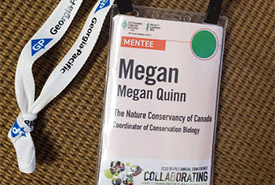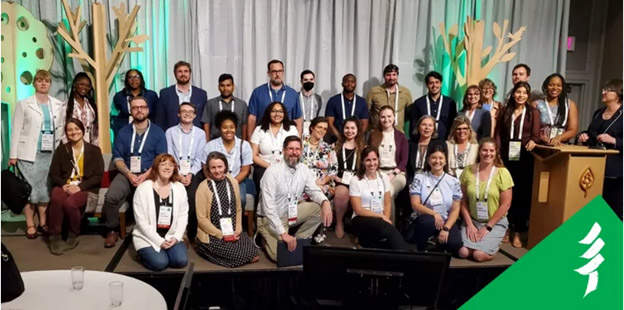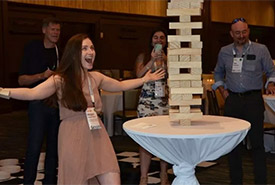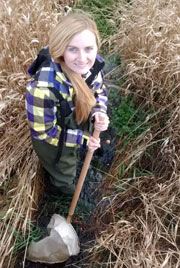SFI Conference Green Mentor Program sets the right example

For many mentees, the 2022 SFI/PLT Annual Conference wasn’t just a chance to meet their mentor in person, but to also hear them speak in conference sessions. (Photo by NCC)
In June 2022, the Sustainable Forestry Initiative (SFI) and its award-winning educational program Project Learning Tree (PLT) came together in Madison, Wisconsin, for a joint conference.
The annual conference’s theme was “Collaborating for Communities and Forests,” so it’s fitting that the conference also played host to its first SFI Conference Green Mentor cohort. Nineteen young adults were selected from across North America to participate in this four-month mentorship opportunity.
Mentees were matched with professionals in the forest and conservation sector, whose experiences were as diverse as the mentees chosen for the program. Every mentee came into the Green Mentor program with different goals — some were students looking to navigate their early careers, while others wanted to expand their work in new directions.

SFI Conference mentors and mentees (Photo courtesy of SFI)
As the coordinator of conservation biology for Eastern Ontario with the Nature Conservancy of Canada (NCC), I’m proud to steward some of the province’s most important natural areas. While reflecting on my attendance at the SFI/PLT conference, I realized how deeply it ties to my work at NCC.
Not only did it allow me to speak about NCC’s great conservation work, but learn more about what the public and private sectors are doing to ensure forestry practices are sustainable. My involvement in the Green Mentor Program highlights the importance of inter-generational partnerships and complements NCC’s significant work in promoting authentic youth involvement. I know the lessons learned will help guide me as I take on additional youth-focused work, including championing youth representation at the United Nations Biodiversity Conference (COP15) in Montreal this December.
For me, being selected as a mentee was a chance to explore a new perspective on the work I do with NCC and curate new ways of sharing my knowledge through speaking opportunities.
The importance of intergenerational mentorships for young professionals in the forest sector cannot be understated. Youth need supportive, welcoming mentors to guide them. A well-intentioned youth program can quickly fall apart if the supports aren’t there to ensure it meets participants’ needs. I’ve been fortunate to take part in several youth focused programs across Canada, and I’m very impressed by the Green Mentor Program.
Accessibility
If a youth mentoring program wants to be impactful, it must offer accessible opportunities. For many young people, the cost of attending an international conference is a huge barrier to entry. As part of the Green Mentor program, travel, hotel, meals and conference fees were covered for mentees, allowing us to fully participate.
Support also extended beyond finances. Leading up to the conference, mentees attended a virtual meeting, connected in a group chat and read through conference guides that covered everything from reminders for international travel regulations to dress code standards. For a young person who may be attending a conference for the first time, these supports help make them feel more prepared. Although this wasn’t my first conference, the Green Mentor program’s resources allowed me to get the most out of every session and gave me confidence that I belonged in this space.
Authentic involvement
At registration, mentees were given name tags that identified them as being part of the program. These colour-coded badges let everyone at the conference know we were here to learn. My mentor, SFI’s president and CEO, Kathy Abusow, opened the conference by encouraging everyone to start a conversation with mentees. For someone walking into a room full of professionals, many of whom have pre-existing relationships with each other, it can be intimidating to take that first step and introduce yourself. Starting the conference on that welcoming tone made me feel like I was authentically involved in the journey.
There were separate events for the mentees to get to know their mentor and fellow program participants, but the focus was on encouraging mentees to attend the main conference sessions and network with everyone. It can be easy to unintentionally isolate young professionals by giving them too many side meetings, but the events put on for the Green Mentor program participants complemented the SFI and PLT sessions, instead of distracting from them.
Seeing work in action and engaging
For many mentees, the 2022 SFI/PLT Annual Conference wasn’t just a chance to meet their mentor in person, but to also hear them speak in conference sessions. It’s one thing to hear about the work someone does, but seeing that work in action and being able to engage in it is far more meaningful.
Mentees were invited to learn and participate in a variety of sessions, including Advancing Opportunities for Diverse Communities in the Forest Sector, Growing Forest Literate Citizens, Building a Progressive Indigenous Relations Training Program, and Fire and Climate Resiliency: Healthy Forests and Community Engagement. The broad programming helped to expand our knowledge, but we were also invited to engage by asking questions and providing our perspectives.
Networking

Megan Quinn celebrates a moment of success during a game of Jenga (Photo courtesy of SFI)
Networking is not solely done in a conference room. Some of the most organic, meaningful conversations I had with conference attendees were during the scheduled fun activities. Whether it was finding a friend for the 5K Fun Run, engaging in a highly competitive game of Jenga or sharing life experiences over a cup of tea, the 2022 SFI/PLT Annual Conference struck a nice balance between fun and work.
The conference was just the beginning for this special SFI conference cohort of the PLT Green Mentor Program. Over the next few months, participants will meet one-on-one with their mentors to explore career goals. Mentees can choose to follow the pathway set out in the Career Pathway Plan, or embark on a self-directed mentoring journey.
Too many times, I’ve sat in a room and felt like the token youth at the table. Not so with my latest experience. The Green Mentor program sets the right example for how youth can be authentically involved in forest and conservation programming. As I reflect on my time in Wisconsin, I feel as though I’ve returned to Canada with a renewed sense of purpose for conservation work, and I’m excited to see what opportunities this program will allow me to explore.
This blog originally appeared on SFI’s website and is reposted with permission.


